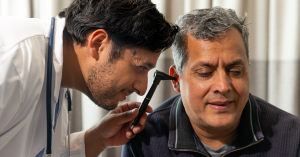You’re at a party, a family gathering, or even just out at a restaurant—and suddenly, you realize you’re smiling and nodding through a conversation you can barely follow. Everyone around you seems to be chatting and laughing with ease, but you’re struggling to keep up. Sound familiar?
Difficulty hearing in crowds is one of the most common and frustrating hearing challenges, especially for adults over 50. But here’s the important part: it’s not just you, and it’s not always a sign of complete hearing loss. In fact, many people with “normal” hearing on standard tests still find crowded, noisy environments nearly impossible to navigate.
That’s because hearing in crowds isn’t just about your ears—it’s about how your brain processes sound, filters background noise, and focuses on the right voices. As we age or experience subtle changes in hearing, this complex system becomes less efficient. The result? Conversations become harder to follow, especially when multiple people are speaking at once or music is playing in the background.
The good news is that there are real solutions. Whether it’s understanding the science behind the problem, making smarter choices in social settings, or seeking professional help, you don’t have to live with the stress and isolation that often come with this issue.
In this article, we’ll break down exactly why hearing in crowds is difficult, what it feels like, and—most importantly—what you can do about it.
How the Brain and Ears Work Together in Noise
Hearing someone in a quiet room is one thing. But trying to follow a conversation in a noisy restaurant, bustling family gathering, or crowded event is an entirely different challenge. That’s because hearing in noise isn’t just about how well your ears work—it’s also about how well your brain can process and filter competing sounds.
Your Brain Does More Than Just “Hear”
When sound enters your ears, it’s just raw data—vibrations traveling through the air. Your brain’s job is to interpret that information: to identify what’s speech, what’s background noise, and what deserves your attention. This process is called auditory scene analysis, and it involves:
- Focusing on the speaker you want to hear
- Suppressing background noise and irrelevant voices
- Decoding speech sounds, even when they’re partially masked by other noises
It’s a complex dance between your ears and brain—and it works remarkably well when everything is functioning smoothly.
Why It Gets Harder Over Time
As we age, this brain-ear coordination becomes less efficient. Even if your hearing seems “fine,” you may notice:
- Slower auditory processing
- Reduced working memory (which helps you follow multi-step conversations)
- Decreased ability to filter competing sounds
This means that in a noisy room, your brain has to work harder—and sometimes struggles—to keep up.
Add in Background Noise, and the Challenge Grows
Crowded environments are full of overlapping voices, clinking cutlery, background music, and echo. These factors force your brain to work overtime, trying to isolate one voice from a sea of sound. Even mild hearing loss can push this system beyond its limits, especially when speech and noise are competing in the same frequency range—which is often the case in real-world settings.
Why Traditional Hearing Tests Might Miss This
Standard hearing tests measure how well you hear tones in a quiet environment—not how well you understand speech in noisy ones. So even if you “pass” a hearing test, you may still have real difficulties in complex auditory environments.
Common Reasons You Struggle to Hear in Crowds
If you find yourself lost in conversation every time you enter a noisy room, there’s more going on than just “background noise.” Several specific factors contribute to why hearing in crowds is so difficult—especially as we age. Understanding these causes can help you find better solutions and feel less frustrated in social settings.
1. Background Noise Masks Speech
In crowded environments, sound sources overlap: music, voices, clinking dishes, footsteps, HVAC systems. This creates a noisy auditory landscape, making it hard for your ears and brain to distinguish speech from other sounds—a phenomenon called auditory masking.
Soft consonants like “s,” “f,” or “th” can easily be drowned out, making speech seem jumbled or unclear. You might hear someone talking but struggle to make out their actual words.
2. Reduced Signal-to-Noise Ratio
In quiet environments, the “signal” (the voice you want to hear) is clearly louder than the “noise” (background sounds). In crowds, this signal-to-noise ratio drops dramatically. When voices are only slightly louder—or sometimes even softer—than surrounding noise, your brain has a much harder time decoding what’s being said.
This issue becomes even more noticeable with even mild hearing loss.
3. High-Frequency Hearing Loss
Many people develop high-frequency hearing loss gradually, especially after age 50. High frequencies carry the clarity of speech—especially consonants—while low frequencies carry the volume.
If you’ve lost some ability to hear high pitches, speech can sound muffled. This is especially problematic in crowds where soft consonants are already competing with noise.
4. Auditory Processing Changes
Even if your ears still detect sound well, your brain may be slower to process it. Age-related changes can impact how quickly your brain:
- Recognizes speech sounds
- Filters out distractions
- Fills in missing words
This delay makes it harder to keep up with fast-paced conversations in noisy settings.
5. Room Acoustics and Echo
Most crowded places—restaurants, halls, public spaces—have hard, reflective surfaces. These amplify sound and cause echoes, making speech harder to isolate. Poor acoustics can make even soft background noise bounce around the room, adding to the confusion.
What It Feels Like: The Real-Life Impact
Struggling to hear in crowds isn’t just a mild annoyance—it can affect your emotional well-being, your relationships, and your sense of connection. Many people who deal with this issue describe it as exhausting, isolating, and at times, even embarrassing. These feelings are valid, and you’re far from alone.
1. Constantly Guessing at Conversations
When you can’t catch every word, you begin to guess at meaning—filling in the blanks as best you can. Sometimes you get it right; other times, not so much. This uncertainty can lead to misunderstandings, awkward replies, or even social faux pas, making interactions feel more stressful than enjoyable.
2. Nodding and Smiling, Even When You Didn’t Hear
Many people default to smiling and nodding when they miss something, just to keep the conversation moving. But inside, there’s often a mix of anxiety (“Did I just agree to something?”) and frustration (“Why is this so hard for me?”).
3. Feeling Left Out in Group Settings
Group conversations are especially tricky. Multiple people talk at once, some speak softly, others laugh loudly—and trying to keep up can feel like watching a movie without subtitles. Eventually, many people start to withdraw, choosing to stay quiet rather than risk saying the wrong thing or constantly asking for repetition.
4. Mental and Physical Fatigue
Trying to decipher speech in noise is mentally taxing. Your brain works overtime to fill in gaps, filter out distractions, and keep up with rapid-fire conversation. This extra effort leads to real fatigue—sometimes even headaches or irritability after social events.
5. Impact on Self-Confidence and Relationships
Over time, these difficulties can chip away at your confidence. You might start avoiding certain events or places. Relationships can also become strained—partners, family members, or friends may not understand why you’re quiet or disengaged, assuming disinterest rather than difficulty.
6. Emotional Toll and Isolation
For some, this leads to feelings of loneliness and isolation, especially when it feels like everyone else is communicating easily. But here’s the truth: many others are facing the same challenge—you’re just not hearing them talk about it.
What You Can Do to Hear Better in Crowds
While hearing in noisy environments is challenging, it’s not hopeless. With the right strategies, tools, and mindset, you can improve how you hear—and how you feel—in crowded spaces. Here’s what really works.
1. Choose the Right Position
Where you sit or stand matters more than you might think:
- Face the person you’re speaking with so you can see their facial expressions and lips
- Sit with your back to a wall to reduce background noise behind you
- Avoid sitting near speakers or kitchen doors in restaurants, where noise is often loudest
These small adjustments can help your brain focus on the voice you want to hear.
2. Use Visual Cues
Your eyes can help your ears:
- Lip reading adds valuable context, even if you don’t realize you’re doing it
- Facial expressions help you follow emotion and intent
- Watch for gestures and body language to support what’s being said
Turning your attention visually toward the speaker gives your brain more data to work with.
3. Limit Background Noise When Possible
- Suggest quieter venues when meeting friends or family
- Visit restaurants or cafes during off-peak hours
- Choose places with soft furnishings (carpets, drapes, padded booths) that absorb sound
If you’re hosting, turn off music or TVs during conversations, or use sound-dampening materials to reduce echo.
4. Use Communication Strategies
- Ask speakers to face you directly and speak clearly, not loudly
- Don’t be afraid to say, “Could you repeat that?” or “I didn’t catch that—can you say it again?”
- Summarize or repeat what you heard to confirm understanding
People are usually happy to accommodate once they understand you’re having difficulty.
5. Leverage Technology
If you wear hearing aids, talk to your audiologist about:
- Directional microphones that focus on the speaker in front of you
- Noise reduction settings or “restaurant mode”
- Remote microphones that pair with your aids and can be clipped to a speaker’s collar
Even if you don’t wear hearing aids, personal amplifiers or live transcription apps can help significantly.
6. Train Your Brain
Just like muscles, your brain benefits from regular practice:
- Try auditory training apps that simulate noisy environments
- Listen to audiobooks or podcasts in background noise to improve focus
- Practice active listening in small groups to build confidence
These exercises help your brain get better at filtering and interpreting sound.
When to Get Help: The Role of Hearing Tests and Treatment
If you’ve tried different strategies and still find yourself struggling to hear in crowds, it might be time to seek professional help. You don’t need to wait until the problem becomes severe—early intervention can make a big difference in how well you hear and how confident you feel in social situations.
1. Recognizing When It’s More Than Just Noise
Ask yourself:
- Do you often feel left out during group conversations?
- Are you avoiding social events because they’re too tiring or frustrating?
- Do people seem to mumble more than they used to?
- Are you frequently asking others to repeat themselves?
These are common signs of early hearing loss or auditory processing difficulties, and they’re worth investigating.
2. What to Expect in a Hearing Evaluation
A hearing test is simple, painless, and highly informative. An audiologist will:
- Review your symptoms and lifestyle challenges
- Perform pure-tone audiometry to measure your hearing thresholds
- Test your ability to understand speech in both quiet and noisy environments
- Discuss possible solutions, including hearing aids, assistive devices, or communication strategies
Even if your hearing is “within normal limits,” these tests can reveal subtle deficits that affect you in crowds.
3. Modern Hearing Aids Are Built for Noise
Today’s hearing aids are smarter and more discreet than ever. Many are designed specifically to help with:
- Speech clarity in noise
- Automatic volume adjustment based on surroundings
- Bluetooth streaming from phones, microphones, and TVs
Some even have AI-powered noise reduction that adapts in real-time, making it easier to follow conversations in complex settings.
4. Additional Tools to Consider
- Personal amplifiers for one-on-one or small group conversations
- Remote microphones you can give to your conversation partner
- Captioning apps for smartphones that display spoken words in real-time
These tools don’t replace hearing aids but can offer valuable support, especially in very noisy environments.
5. Don’t Wait to Take Action
Delaying a hearing evaluation doesn’t just affect your ears—it impacts your mental sharpness, emotional wellbeing, and social life. The sooner you seek support, the better your outcomes will be.
FAQ
Why is it harder to hear in crowds than in quiet places?
In noisy settings, background noise competes with speech, making it harder for your brain to focus on the voice you want to hear. This reduces the signal-to-noise ratio, forcing your brain to work harder to isolate and interpret speech.
Is struggling to hear in crowds a sign of hearing loss?
Not always, but it can be. Many people with normal hearing still struggle in noisy environments due to aging, mild hearing loss, or auditory processing issues. If this is a recurring issue, it’s a good idea to get a hearing test.
Can hearing aids really help in crowded environments?
Yes. Modern hearing aids include directional microphones, noise reduction, and customizable settings designed specifically to improve hearing in challenging soundscapes like restaurants, group events, or parties.
What’s the best way to improve hearing in crowds without hearing aids?
Position yourself wisely (e.g., face the speaker, sit away from noise sources), use visual cues, and try apps or devices like personal amplifiers or real-time speech-to-text tools. Reducing background noise and practicing active listening also help.
When should I see a hearing specialist?
If you regularly struggle to follow conversations in noisy places, feel frustrated or fatigued after socializing, or notice you’re avoiding group settings, it’s time for a hearing evaluation—even if you haven’t noticed problems in quiet environments.
This article is for informational purposes only and is not a substitute for professional medical advice, diagnosis, or treatment. If you are concerned about your hearing or ear health, please consult a qualified healthcare provider.






